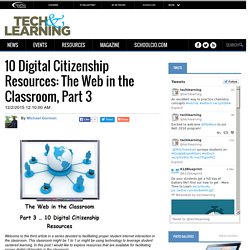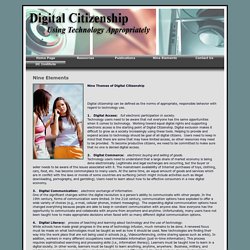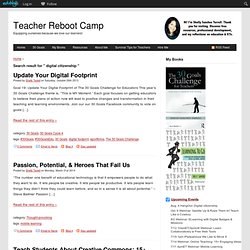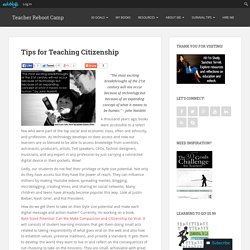

10 Digital Citizenship Resources: The Web in the Classroom, Part 3. Welcome to the third article in a series devoted to facilitating proper student internet interaction in the classroom.

This classroom might be 1 to 1 or might be using technology to leverage student centered learning. In this post I would like to explore resources that are available for facilitating proper digital citizenship in the classroom. Upcoming Opportunities: Are you traveling to Learning Forward Conference in Washington DC in December? Check out my PBL and Technology Integration Workshop. 10 Digital Citizenship Resources: The Web in the Classroom, Part 3 ( In the last two posts I have been providing ideas and reflection regarding the use of the internet in the classroom. The Ten Resources Common Sense Media Student Video The Common Sense Media Student Video Library has more than 20 videos that are each 2-4 minutes long. Digital Citizenship Scope and Use Common Sense Media’s Scope & Sequence tool to find the lessons that are just right for your classroom. Untitled. Untitled. Teachers: Teach digital citizenship and discover the best apps, games, and websites rated for learning.
Educators. Nine Elements. Nine Themes of Digital Citizenship Digital citizenship can be defined as the norms of appropriate, responsible behavior with regard to technology use. 1.

Digital Access: full electronic participation in society. Technology users need to be aware that not everyone has the same opportunities when it comes to technology. Working toward equal digital rights and supporting electronic access is the starting point of Digital Citizenship. 2. 3. 4. 5. 6. 7. 8. 9. Respect, Educate and Protect (REPs) These elements have also been organized under the principles of respect, educate and protect. Respect Your Self/Respect Others - Etiquette - Access - Law Educate Your Self/Connect with Others. [rd] Digital fluency for the digital age. A digital fluency subject to teach students the knowledge, skills and attitudes necessary for the digital age is needed, writes Gerald White.
![[rd] Digital fluency for the digital age](http://cdn.pearltrees.com/s/pic/th/digital-research-developments-118143820)
Technology has been changing the way people learn and interact for thousands of years. Many researchers argue that major innovations adopted by society have an effect on the structure of the human brain. Digital Citizenship/Games and Activities. Digiteens: Digital Citizenship by Digital Teenagers. Mydigitaltat2 in Palo Alto, Ca. Global Digital Citizen Foundation. FoundAct2. Webinar- Digital Footprints, Safety & Citizenship. Digital Footprints, Safety & Citizenship. Get Them Learning with Digital Icebreakers. Webinar Recording: Digitally Safe & Responsible Citizens. Sharing the Narratives of Our Lives: Meaningful Learning with Mobile … Teens Digital Safety. Search Results digital citizenship. Posted by Shelly Terrell on Saturday, October 26th 2013 Goal 19: Update Your Digital Footprint of The 30 Goals Challenge for Educators This year’s 30 Goals Challenge theme is, “This is MY Moment.”

Each goal focuses on getting educators to believe their plans of action now will lead to positive changes and transformation in their teaching and learning environments. Join our our 30 Goals Facebook community to vote on goals […] Read the rest of this entry » Posted by Shelly Terrell on Monday, March 31st 2014 “The number one benefit of educational technology is that it empowers people to do what they want to do. Read the rest of this entry » Posted by Shelly Terrell on Monday, December 23rd 2013 Included in the Digital Tips Advent Calendar and part of the Effective Technology Integration category “Nothing is original. Read the rest of this entry » Posted by Shelly Terrell on Thursday, December 19th 2013 “Technology is just a tool. Survival Tips for Teaching Citizenship.
“The most exciting breakthroughs of the 21st century will not occur because of technology but because of an expanding concept of what it means to be human.” – John Naisbitt A thousand years ago, books were accessible to a select few who were part of the top social and economic class, often one ethnicity, and profession.

As technology develops so does access and now our learners are so blessed to be able to access knowledge from scientists, astronauts, producers, artists, Ted speakers, CEOs, fashion designers, musicians, and any expert in any profession by just carrying a connected digital device in their pockets. Wow! Sadly, our students do not feel their privilege or byte size potential. Not only do they have access but they have the power of reach.
Pew Research Center's Internet and American Life Project. Slides: Digital Footprints, Safety & Citizenship.